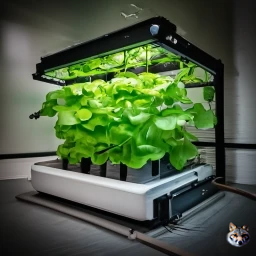Aquaponic Gardening: A Sustainable Approach to Year-Round Harvests

In the realm of sustainable gardening and homesteading, modern aquaponic systems have emerged as a revolutionary method that seamlessly integrates aquaculture and hydroponics to create a harmonious ecosystem that nurtures both plants and fish. This innovative approach not only maximizes space utilization but also minimizes water usage and reduces environmental impact, making it an ideal solution for urban gardeners and homesteaders alike.
At its core, aquaponic gardening harnesses the synergy between fish and plants. Fish waste, rich in nutrients, is broken down by beneficial bacteria into soluble compounds that serve as an organic fertilizer for plants. These nutrients are then absorbed by the plants, effectively filtering the water and returning it purified to the fish tanks. This cyclical process creates a closed-loop system that requires minimal external inputs.
Advantages of Modern Aquaponics:
- Water Conservation: Unlike traditional soil-based gardening, aquaponics uses 90% less water. The recirculating nature of the system means that water is continuously reused, making it an eco-friendly alternative for regions prone to water scarcity.
- Year-Round Harvests: Aquaponic systems can be set up indoors, allowing for year-round cultivation regardless of weather conditions. This is particularly advantageous for homesteaders seeking a consistent supply of fresh produce throughout the year.
- Space Efficiency: Vertical and compact designs make aquaponics an excellent option for urban gardeners with limited space. The system's flexibility enables it to fit on balconies, rooftops, or even within small greenhouses.
- Nutrient-Rich Produce: The organic nutrients derived from fish waste contribute to healthier, more robust plant growth. This results in nutrient-dense produce that boasts exceptional flavor and nutritional value.
- Low Environmental Impact: By eliminating the need for synthetic fertilizers and pesticides, aquaponics reduces the potential for harmful runoff and soil contamination, making it a sustainable and eco-conscious gardening method.
Setting up a modern aquaponic system involves selecting the right fish species, understanding water chemistry, and creating a balanced ecosystem. Common fish choices include tilapia, trout, and perch, while leafy greens, herbs, and even fruiting plants thrive in the nutrient-rich water. Monitoring water quality and ensuring proper fish and plant care are essential for a successful harvest.
Modern aquaponic gardening epitomizes the harmonious relationship between nature and technology. Its resource-efficient, space-saving, and environmentally conscious approach aligns perfectly with the values of sustainable living. As homesteaders and gardeners look to the future, embracing aquaponics offers the promise of bountiful harvests, reduced ecological footprints, and a closer connection to the cycles of nature – all within the confines of one's own backyard.
